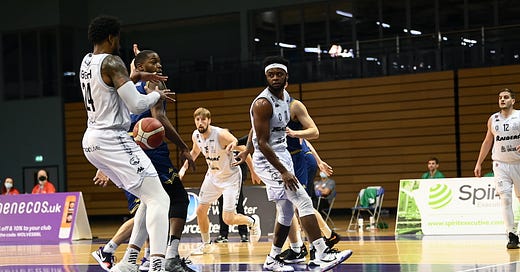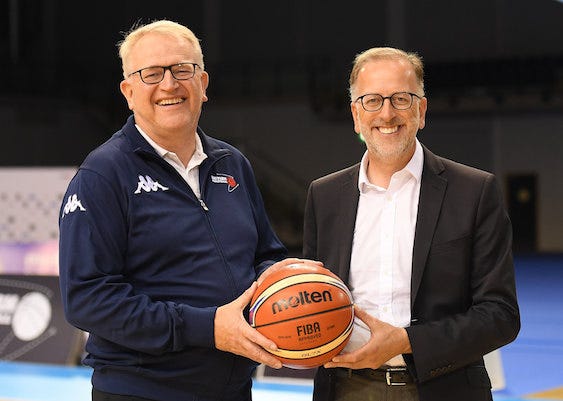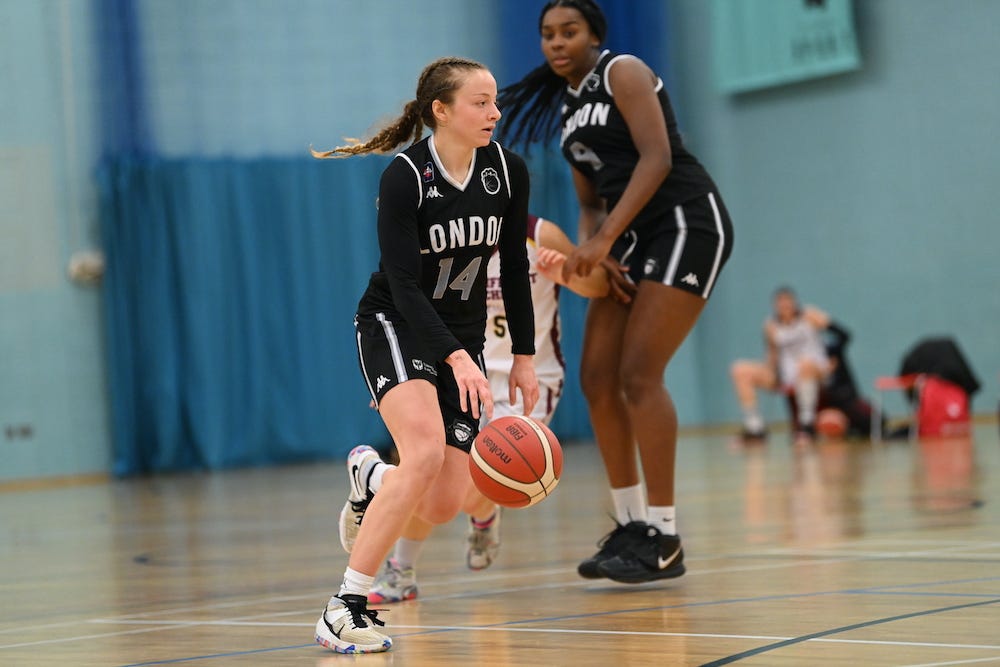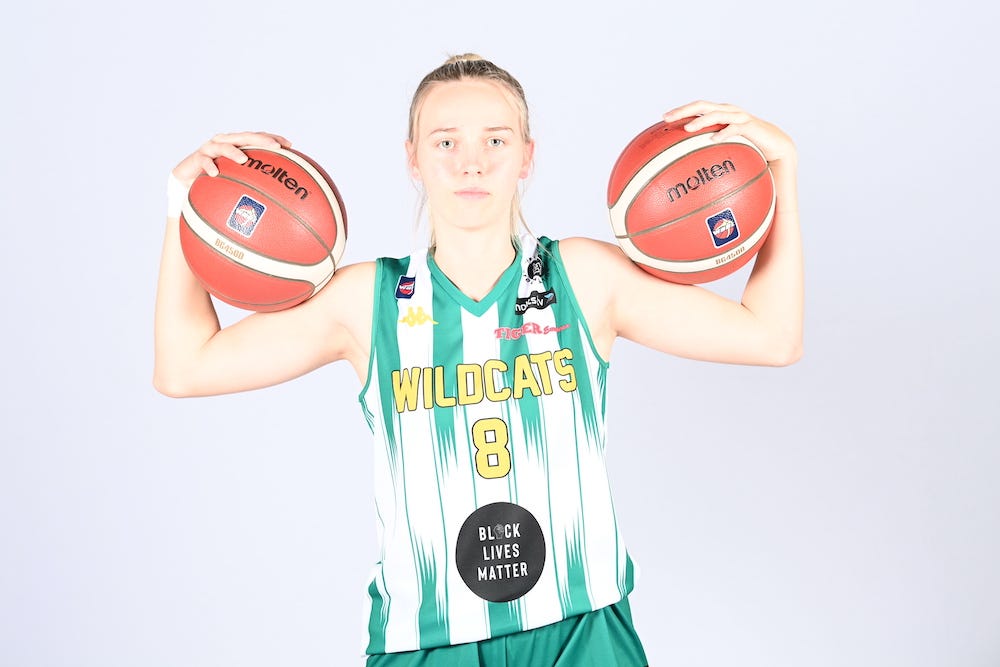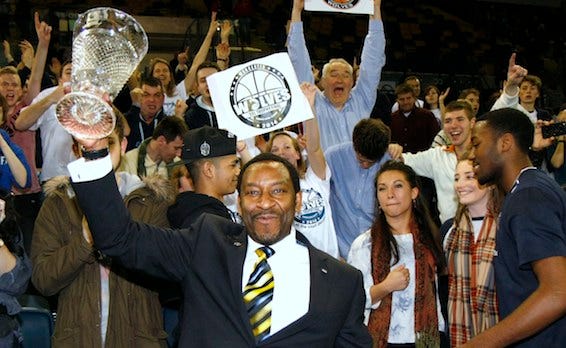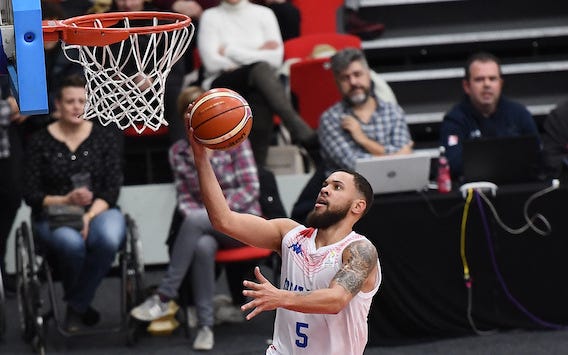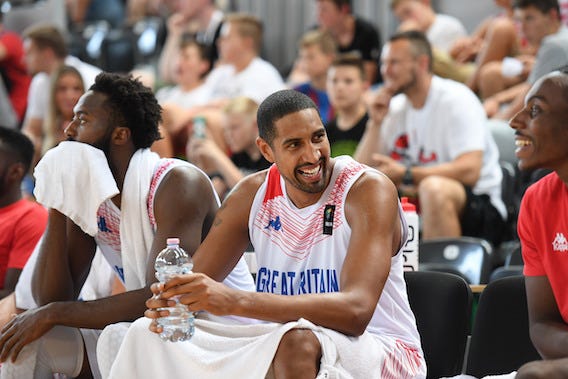Welcome to the tenth edition of The Post Up.
As compelling BBL and WBBL title races near their conclusion, attention is already turning towards next season. But, as we reveal, for one storied club, a move to a new city may beckon as their ambitions escalate.
Europe – everyone’s favourite issue in recent years – is also top of mind again as two more teams tell us about their continental ambitions.
Tia Freeman outlines why the WBBL has become an alternative option for young Brits who’d rather skip America while Teddy Okereafor reveals the fruits from his labours on home soil.
While we exclusively outline the new schemes being laid down to improve the lot of players – and the communities surrounding them.
If you like The Post Up, please subscribe to get future issues direct to your email, tell your friends - or consider becoming a Patron to allow us to keep producing further content at MVP247.com.
Feedback from our recent survey (thanks for those who have responded so far – still open here, if you’d like your say) suggested that few of you would be prepared to pay for The Post Up. So this edition will be the last in our free trial.
We will explore further opportunities to develop the newsletter in the months ahead but stay tuned to the website and MVP’s social channels for all your British basketball news.
Here’s to an exciting conclusion to the campaign – MW.
Last night at the Pavilions?
Could the Plymouth Raiders become … the Birmingham Raiders?
MVP can reveal that an abrupt exit from Devon is a legitimate option on the table for the 2021-22 season, with Raiders officials confirming they have looked at “3-4 options” as a potential new home for the club.
It has been widely known for some time that Plymouth, under past and present regimes, have been frustrated by their hometown’s inability to help deliver a purpose-built arena to supplant the ageing Pavilions.
Ambitious plans have been drawn up, and major investment injected, since the Raiders’ purchase by Turkish education billionaire Enver Yucel in February 2020 – including an excursion into Europe within the next two years.
And the UK’s second largest city has emerged as a possible alternative destination with a significant increase in costs of using the Pavilions, in addition to its relatively small capacity, now tipping the scales away from staying put.
“The truth is we want to stay in Plymouth,” confirmed Raiders’ director Dr. Basek Akdemir, the principal representative of Yucel’s BAU Global organisation.
“We operate schools in several countries but the reason we chose to get involved with Raiders, rather than London City Royals, was because we own an educational facility in Plymouth.
“The issue is we cannot afford a 200 per cent increase for next season. The Pavilions are asking us to play more than the next highest rent in the BBL.
“We have looked for alternatives in Plymouth but the problem is that there is nothing suitable.
“So we might explore a move to a different city. We have looked at three or four others. Birmingham is also an option.
“We want to remain in Plymouth but it will come down to the next few weeks.”
The need – and demand – for a venue upgrade has become all the more urgent with Yucel going public with his frustration on social media on Tuesday.
On Twitter, he said: “Concerned and looking for a location for our games next season. Letting fellow basketball lovers know.”
Birmingham’s Utilita Arena – still the regular venue for the BBL Cup final - could provide a large-scale home for professional basketball for the first time since the Bullets folded in 2006.
With smaller venues in the city available too, it is a market with huge potential and one long coveted by the league for expansion.
The numbers in Plymouth, Akdemir underlined, just do not stack up as they are currently laid out by their long-time landlords.
“They have given us a deadline,” she added. “We cannot meet their price. And we also do not want another year without any fans.
“If we are without fans next season, it will not be at the Pavilions.”
Whether the threat is a bargaining chip or a legitimate signal of the impending invocation of a nuclear option, it has not come out of the blue.
Plymouth Council are believed to have identified the need for a specialist basketball centre in the city as long ago as 2012. However a change in their business model saw the Pavilions effectively privatised, removing the leverage of the local authority on the venue.
“It’s no secret we had problems with the operator,” said former Raiders’ co-owner Ross Mackenzie.
“There have been challenging conversations because of the cap on the number of people we could get in, which is less than 1,500.
“The simple mathematics are that, with charging what the local economy will support for a ticket, you simply have to have a near-full arena to even make a small profit. Most games lose money.
“And when you need to run it as a commercial enterprise, that puts the club in a very awkward position.”
With the playoffs being staged at neutral venues, it raises the possibility that Sunday’s closed door game with Sheffield Sharks could represent the Raiders’ final farewell after 38 years in the city.
BBL sources affirmed that the idea of a rare franchise relocation – the first since Lions decamped from Milton Keynes to London a decade ago - has yet to be discussed at league level.
Although each of the eleven clubs has a specific geographic territory, it is understood that no formal approval would be needed to take flight to a city that is currently without a team.
A spokesperson for the Pavilions said “the relevant people have been unavailable for comment.”
To Europe, and beyond, for Lions?
London Lions are taking a serious look at playing in European competition next term.
The Lions of the Women’s British Basketball League, that is.
The last time a female side from the UK tested itself against the continent’s finest, John Major was Prime Minister and Meat Loaf was declining to do absolutely anything for love in the popular music charts.
A cursory look down the roster of the recently-crowned Trophy winners shows that most of them were not born when Sheffield Hatters took part in the Ronchetti Cup in 1993.
But with the (men’s) Lions confirming that they plan to take a second stab at the Basketball Champions League come the autumn, their sister act are pondering a parallel push in the EuroCup, head coach Mark Clark confirmed.
“I would say it's really possible,” he told MVP. “I would hope we can get some decisions over the line and make people feel comfortable with a decision.
“I don't think that's on-court. It's more difficult for British clubs to make the step to do that stuff off-court: you know, staging games midweek, promoting games, compliance with all those FIBA regulations.
“But you know and I know that FIBA will be desperate for British teams to play in Europe. They want teams from all over Europe.
“Lions tried to do this year. Leicester have done it. So both those clubs are doing it. So why shouldn't a women's club try and do it?
“And with the Brexit rules, who knows what impact that's going to have on the availability of some really talented British players.”
That the integration of Barking Abbey into the Lions should have coincided with the heavy investment into the capital club by Miami-based 777 Partners has created the perfect storm.
It has driven the (BA) Lions from worst to close-to-first in the WBBL, a boomtime that has been largely overshadowed amid the cash injection that has lured former NBA talents to the Copper Box to affirm a revolution in the making.
Yet there are shades of Clark’s early forays into basketball at Crystal Palace where men and women’s programmes sat side-by-side with lofty ambitions shared and collated.
“OK,” he underlines, “the financial numbers for each programme are going to be different, like they are everywhere in Europe before anyone jumps on that one. It's just the way it is.
“But 777 want to invest in the women becoming a team that can play in Europe. When is the question, not if.
“And so that's why we brought Kennedy (Leonard) in because she has the British status. And that's why we brough Shanise (Beckford-Norton) back and Chantel (Charles) back and we've got plans to bring other British players back.
“If I’d known Azania Stewart was going to come out of retirement, that would really have been an interesting option. She's 32 years young, I'd love to see her play back in London for the first time since she went to the States for high school.
“And then you build that on top of what we've already got at Barking.
“Lions have a desire to bring a European-style development programme where we're feeding players through, everything's good.
“Obviously, everyone will then say, well, the proof will be in what happens. But the 777 people, the way they want to commit to British basketball is great because their interest in the league is really, really positive.”
All roads, he trusts, will lead across the Channel in the years ahead. A necessity, not an optional luxury.
“If you're not going to aspire to play in Europe, why are you doing it? Are we supposed to be a professional league? We are supposed to be and we're all striving for it.”
However few view 777 as some kind of benevolent charity, shipping dollars across the Atlantic as the kind of tax write-off that funded at least one club in its halcyon era of three decades ago.
A long-term game the Lions purchase may be – ditto a £7.3 million buy-in to the BBL that, sources confirm, is not yet over the line – but investors demand profits that translate into returns.
Last weekend’s EuroLeague Women final was won by UMMC Ekaterinberg, who are lavishly sponsored by an ultra-rich Russian conglomerate who can bestow extraordinary seven-figure contracts on the finest trinkets the WNBA can export.
The WBBL – a thousand levels below - barely scrapes by, financially. Throw a Euro adventure onto the budget, and can the sums truly add up?
Retorts Clark: “That's a really good question, isn't it? I think there's no better time for women's sport to try and make money because the profile of women's sport is so high. The profile of particular players is really high. If we can get some commercial interest in ... but you've got to have a product that people want to watch.
“And it's not about us competing with netball. It is a different game to a different audience, that club-wise is only really ever going to be a club British game because of the geography of where the good clubs are.
“So we've got an opportunity to give women the chance to play in in top European competition in a top league.”
He can view both at close hand with his daughter, Ella, pulling double duty for Leicester Riders and the netball Superleague’s Loughborough franchise.
There is much, he suggests, that they could and should learn from each other, from schemes in Australia, for example, where they share resource and centres of excellence.
“I don't like the way it's seen as either or,” Clark underlines. “Ella has proved that you can do both successfully.
“But if I really get down to it, basketball is a bigger sport. Basketball is a bigger worldwide sport. And we've got to try and take our place on a bigger platform. And we've got a bigger platform to play on.
“Netball is a great sport. But after soccer, we are the second-biggest sport in the world and Britain deserves to have teams playing at the highest level.”
Tia a beneficiary of staying home
Call them Generation W.
The first crop of young homegrown heroines who have never known anything but the Women’s British Basketball League.
From a hoops nursery to a semi-pro opportunity on home soil, with a few quid here and there as a return on time invested.
“I think it's good,” Nottingham Wildcats young tyro Tia Freeman underlines. “I started playing WBBL when I was about 16. So I can't complain.
“I got into the league super-early, which has massively helped me for sure.”
Capped by Great Britain at Under-20 level, Freeman is one of a crop who eschewed the bright lights of the United States for an education in the UK (in her case, at Nottingham Trent) and a pathway that took her from baby steps at Oaklands Wolves and onto a switch to this season’s Trophy runners-up.
The schooling on offer, she declares, was simply better than across the Pond. The WBBL unlocked a level of competition that allowed her to resist the NCAA.
It could still be improved as an option, she believes.
“Maybe you focus more on British players,” Freeman maintains.
“I mean, the Americans are nearly always the stars on the team, or the Europeans. Maybe we should try get more emphasis on Brits being in the league and focus on that.”
Bigger budgets could retain some who chose ultimately to depart and lure back those who have flown the nest.
Freeman has flourished despite missing out on the conclusion of her Under-20 eligibility on the international thanks to Covid-enforced cancellation of European age-group championships.
It has made me even hungrier to earn a GB call-up at a senior level, she adds. “I feel like my stats are improving each year, bit by bit.”
It helps that former contemporaries have already made that leap. A trail blazed.
“People like Savannah Wilkinson have gone and trained and played in that team. I played U20s, a couple years younger. So it would have been my last year, last summer that got cancelled.
“But for sure the players coming through like Savannah, like Kyla Nelson, they are super, super talented players who I'm trying to be like.”
Showcasing herself within the WBBL can smooth the path towards a senior cap as others have found.
Averaging 8.3 points on 35.8% shooting this term, the guard has been handed additional experience as the Wildcats have dealt with injuries and bumps in the road.
“I don't think we've had our full team once this season,” Freeman affirms. “We've always had someone injured.
“But we've pulled together. Different players step up in different games. We've got Chelsea Shumpert, Simone Costa, Siobhan Prior. I think we’re a good team.
“We have the academy players coming through like Maisie Evison and Shaniya Rose who really help us.”
Not enough in the Trophy final when London Lions were maddeningly dominant. Cut well adrift from the top three as a compelling WBBL title race nears its end.
That loss still bites, Freeman says. Motivation and fuel for Nottingham in the playoffs.
“Obviously, it was super-difficult on the day, I think everyone just lost their heads in that game.
“But we've already tried to make tweaks in practice and just as a team. But I think we definitely have the potential to make it far and make a good run in the playoffs still.”
Salary cap uptick needed: James
It’s not just Lions looking at competing on foreign shores.
“The possibility is very high,” acknowledged Plymouth Raiders head coach Paul James of internal ambitions to enter the FIBA Europe Cup next term as a starter for 10 in the club’s expansion plans.
His new bosses, BAU Global, have experience of continental odysseys through their ownership of Turkish side Bahcesehir College.
Same blueprint unleashed for their British investment, reveals James in a forthcoming edition of the MVP Cast.
“Maybe next season, maybe the season after,” he said. “But everything has to line up to allow us to be competitive. I don't see the point in doing it if we can't be competitive.
“And so the owners, the BBL, need to look and see how they can help to allow clubs that do want to go into Europe.”
Which, insists the first man to coach 1000 games in the UK’s top flight, must mean a rise in the salary cap for next season, an increase resisted last summer among the strategy for self-preservation and survival enacted by several teams.
Planning ahead remains problematic yet London Lions have stated their desire to re-enter the Basketball Champions League.
But, James observes, the impossible act of fitting under the domestic limit of £250,000 on wages – even with exemptions for two British talents per team – has provided the capital outfit with a significant headache.
Ultimately, the 56-year-old believes, those artificial constraints are holding back the sport from a natural upward trajectory and a reputational improvement.
“You see teams such as London with investors, Plymouth now with investors, who are able to go and put teams together to be competitive in Europe,” he declares.
“But the league - the BBL league regulations and salaries, cap or team caps - doesn't allow those teams to be competitive because of the way it's structured.
“And I think that's a shame because I think it's keeping the level and standard of basketball back in the BBL. Potentially, it's not allowing this the sport to grow as much as it could do.
“It's not given us that audience in Europe so people can see that actually: ‘Wow the BBL, they have got teams who can compete’.
Which will then encourage other players to come and play in the BBL. It's tough to recruit a player to the BBL because we're not playing in European competition. A lot of agents don't think it's a good league - we're actually it's a much better league than people do think.
“But I think we can do a better job in actually promoting our sport moving forward. And being able to allow teams - if they're able to - to do what they have to do to go and play in Europe, and be competitive, not just to make up numbers, but go and be competitive, win some games … that will do the world of good for the British game and for the BBL.
“Because it's going to attract some people. It will attract probably other investors, because we're getting it done on a wider stage.”
Paul James is the guest on the next edition of the MVP Cast, available on Wednesday. Subscribe to the podcast via your preferred provider or stream every edition via mvp247.com.
Teddy comforted by warm embrace
A year back at home has been an unexpected treat for Teddy Okereafor.
Maybe not one he envisaged 12 months ago before Covid threw the world the ultimate curve ball.
At 28, and with a solid rep established in prime leagues such as Italy’s LegaBasket and Greece’s A in his CV, signing for Bristol Flyers was undoubtedly a simpler option than navigating a pandemic overseas.
But the Great Britain point guard has sought to peer ahead at his future. Building contacts. Boosting his profile through a regular column in the preferred newspaper of the proletariat, The Morning Star. Seeing what is out there, even in lockdown.
“New opportunities present themselves,” the Londoner confirms. “So to have an experience and then be able to talk about the BBL and shine light on it and bring people more people to it is a good thing.
“And that's what the year has been about for me, off the court.”
His initial spell in his domestic league has marked another step in a welcome reversal of the talent drain. Who, in an ideal world, would not want to see a pristine talent like Okereafor competing in his homeland rather than exiled overseas?
Conditioned to hoops elsewhere, his taste of the motherlode has opened his eyes too.
“It's faster than I expected,” he admits. “I'm still adjusting to even though it's late in the season, but we've got good talent.”
Bristol would love to keep him. A pass-first point guard will always slot seamlessly into a niche in any league. His consistency has stood out among the Flyers’ difficulties in achieving that very quality. Team-mates, first in his line of sight.
“That's how I've always played,” he outlines.
“So it's transferable in any kind of league. So that's just what I'm doing. And then it's just helping other guys and using experience to put us in the best situation to win.”
But would he remain next term, in Bristol or London or Plymouth, or somewhere providing an offer attractive enough to keep one of our best in the UK?
Some may struggle to get work in a post-Brexit landscape where free movement – or a lack of – will reduce opportunities within the EU.
Not Okereafor though, who does the little things so well with an approach beloved of coaches and recruiters.
Being close to his brothers and sisters here has been a boon, he concedes. Once the campaign is done, he will assess the options as they arise, at home and abroad. “Talking to my family, get their opinions and then think and then see what situation makes the most sense.”
But has the BBL improved enough to magnetise our finest and beckon them back for good? A simpler sell when investment has allowed some teams to offer attractive wage packages. Regrettably there is, perhaps, still not enough of those for all who would like to return.
“I know finance is a big thing for certain people at different stages in their lives,” Okereafor adds. “Some people have families.
“But I don't know if people have got the full experience of playing in the league. For me personally, I haven't looked at it like a negative or tried to look down on it.
“I've tried to just make the best of the opportunity and play with new guys and new players. So it's been fun for me.
“I don't know how many guys would come back soon but I think it's an option and it's a realistic one.”
BBL to launch its Support Act
Pressure from players to have a greater input into the strategic direction of the British Basketball League, and to improve the welfare provided, is set to bring landmark changes in time for next season.
It comes amid a concerted push for a formal influence for the first time since the Basketball Players Association was disbanded over 20 years ago.
Masterminded by former Great Britain captain Kieron Achara, two adjoining schemes are in the offing - BBL Supports and BBL Inspires - with the former programme aimed at nurturing players for the world outwith basketball and the latter to utilise their status to positively influence the community “and be role models and ambassadors for future generations.”
With some criticism over the scale of the league’s response to social issues following the accelerated visibility of the Black Lives Matter movement last year, the twin approach will be sculpted by a new forum, The Players Voice, to provide a direct channel of communication for representatives from each team to have input on issues around the game – with a promise to listen, and act.
“BBL Supports will have a three-pronged approach,” Achara revealed.
“Players Voice will improve the transparency and the dialogue between BBL, clubs and players.
“There will be an Ambassadors Programme, so if you want to be more invested in your community, then you should have the help and support to do that. And we want to create opportunities in education and training to prepare players for life outside sport.
“And players will have a say in what those should be. Because they already have a voice but it’s just not being heard and the channels are not there.
“So by creating those, the programmes and what they deliver will completely up to them.
“But we can recommend ideas like how they can tap into existing contacts. Or build businesses, like the likes of Ashley Hamilton has done with delivering social media strategy for business. There is an opportunity there to be more holistic.
“And the third strand will be a Legacy Programme. So many guys come through the game but how do they stay involved and be a positive beacon? And create opportunities to be visible for themselves and on behalf of the organisation?”
It will link in tandem, he trusts, with the BBL Inspires initiative that is set to reach outward and deploy players, coaches and the resources of the clubs into the communities around them.
“We can do a better job,” said Achara, who works extensively with other sports in his post-basketball career and has gratuitously poached learnings to infuse into his grand scheme.
“And it will allow players to get involved in matters that are close to us, whether it’s diversity and inclusion, or giving opportunities to young people to get involved in basketball, or whatever.
“The main thing is that players can play an integral role and they should be involved.
“Before, there’s been barriers to that. It’s nobody’s fault but we want to take them away.”
The BBL has pledged to put resource behind both streams of activity ahead of - and following - a formal launch planned for during the forthcoming playoffs.
“All clubs and players have been contacted and informed in the last month,” said the league’s head of communications, Selina Conroy.
“Building the foundations is taking time because we want to get it right. And Kieron has joined us to help drive it forward and he will be integral in pushing it.”
“We’ve not been able to do it before but there is no league without our players.”
ICYMI
BBL / WBBL Playoffs to move to neutral venues
Plans to bring Bears back in Brighton
Why Pharroh Gordon no longer takes the knee
Karlie Samuelson loses out in EuroLeague final
Images: Ahmedphotos

